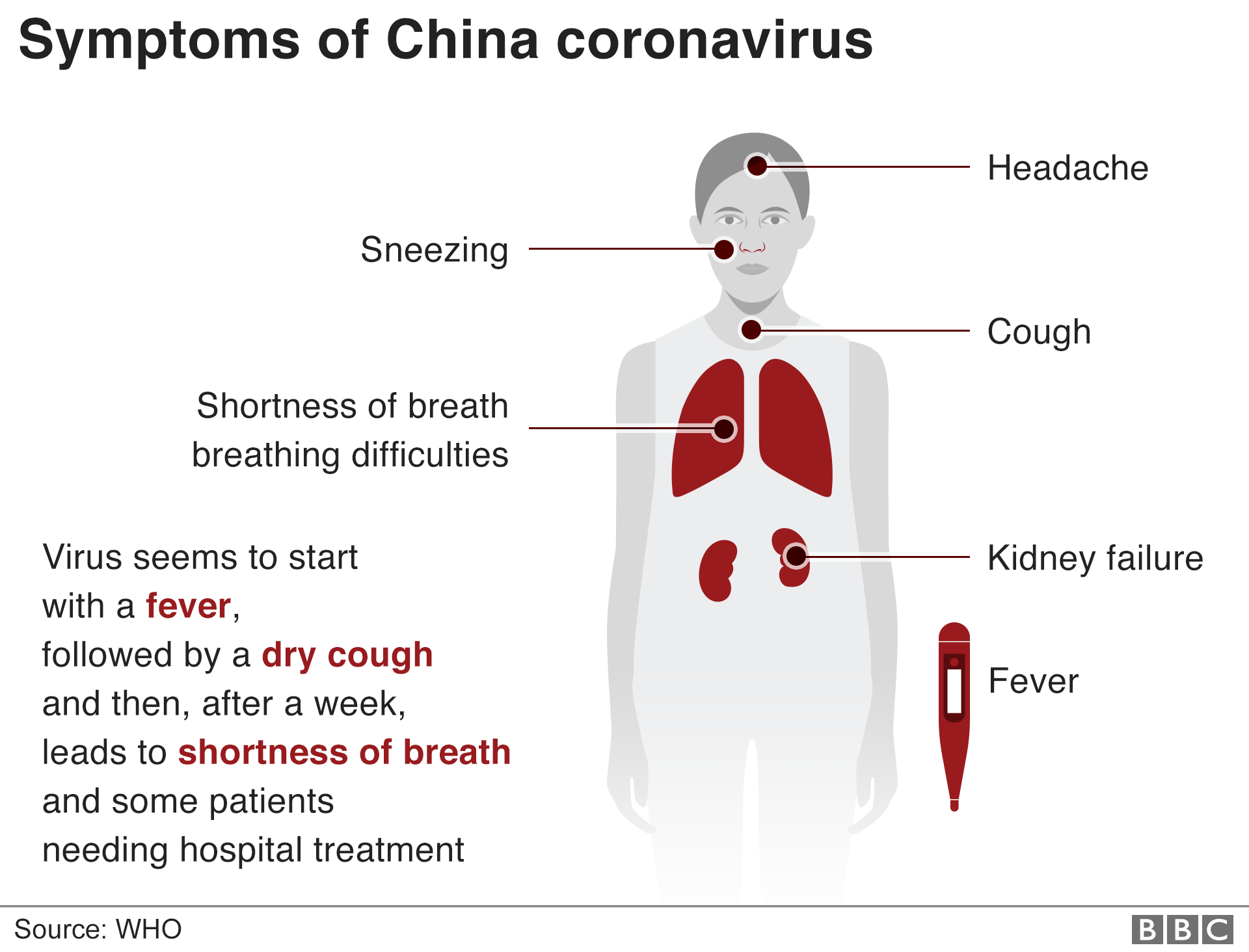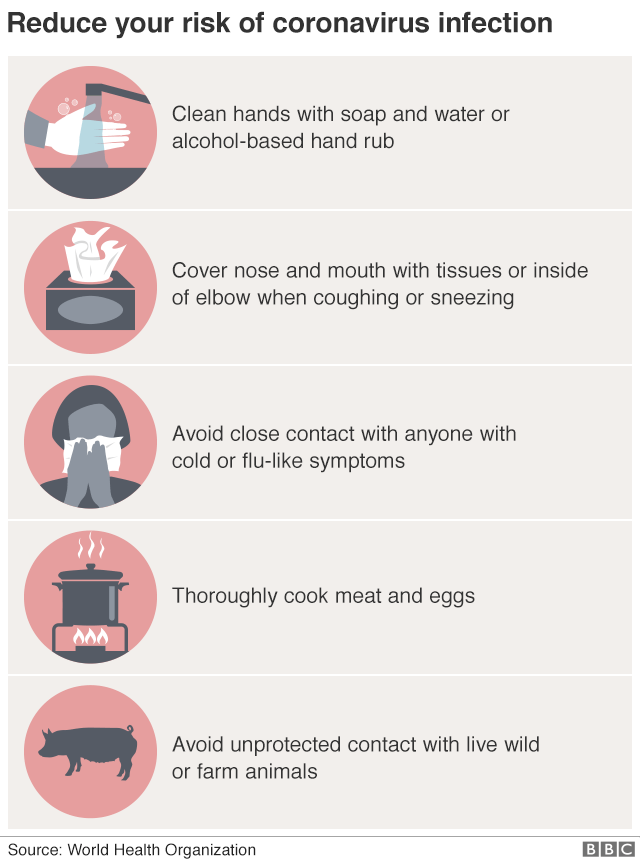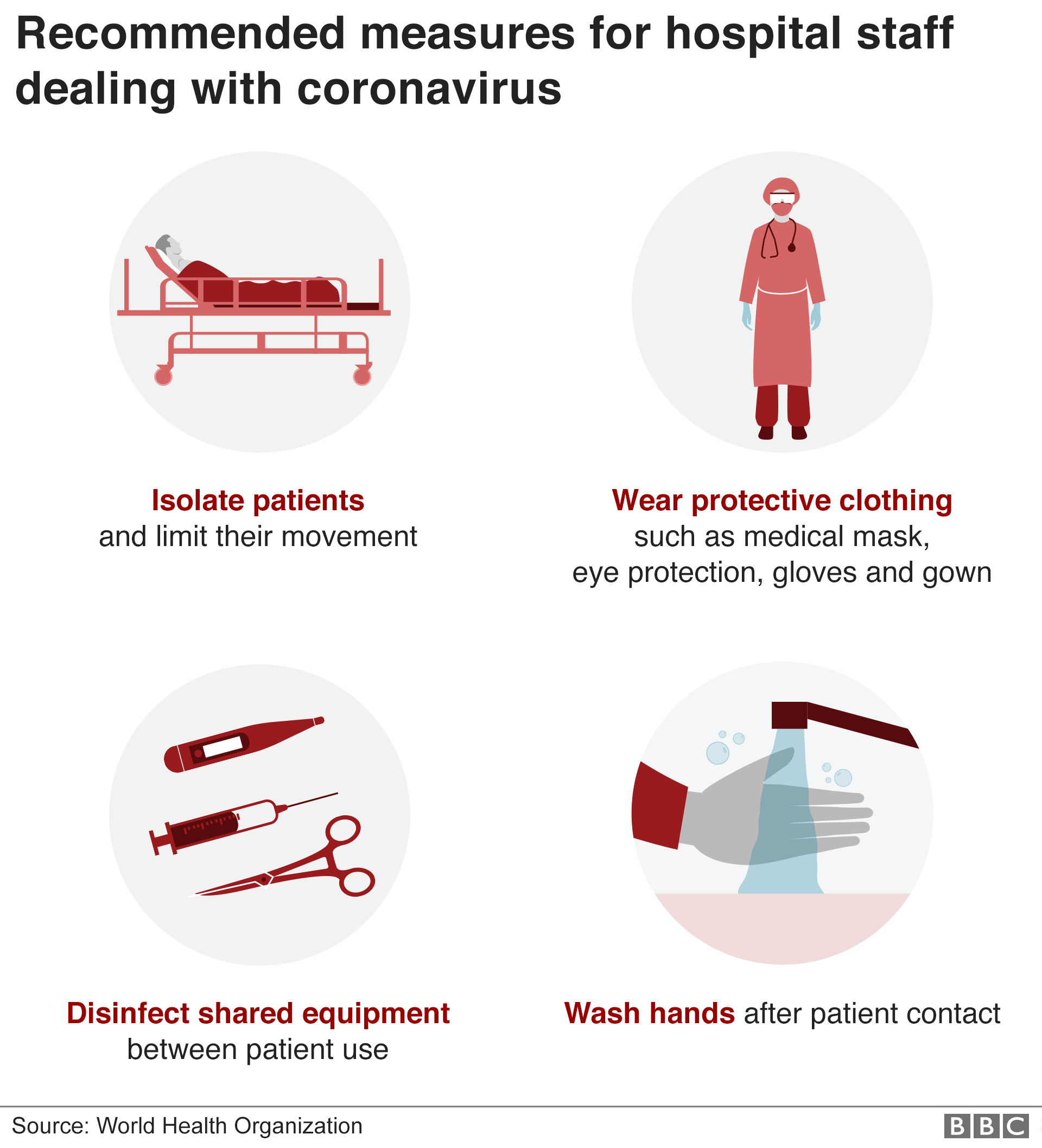 |
A respiratory virus first detected in the Chinese city of Wuhan has now infected thousands of Chinese citizens and spread to a number of other countries.
The fast-moving infection, which causes pneumonia-like symptoms, has been declared a global emergency by the World Health Organization.
It has claimed more than 300 lives and prompted Chinese authorities to quarantine several major cities.
Here are six maps and graphics that will help you understand what is going on.
1. Cases have been mainly in China
Thousands of confirmed cases have been recorded across China, with central Hubei province the worst-affected.
The World Health Organisation (WHO) is warning the number of cases is likely to rise further, and Chinese authorities have introduced a number of measures to try to halt the virus's spread.
Travel restrictions have been imposed on a number of cities in Hubei province and people have been asked to wear face masks in public places.
The Chinese government has also closed a number of temples, the Forbidden City and part of the Great Wall.
The growing list of restrictions came at the beginning of a week-long holiday celebrating Lunar New Year - one of the most important dates in the Chinese calendar - when millions of people travel home. The national new year holiday was extended by three days to 2 February, in an attempt to contain the spread.
The WHO declared the crisis a global health emergency on Thursday.
"The main reason for this declaration is not what is happening in China but what is happening in other countries," said WHO chief Tedros Adhanom Ghebreyesus.
The concern is that it could spread to countries with weaker health systems.
2. Hubei province has been particularly badly affected
More than 9,000 cases have been recorded in Hubei province - the centre of the outbreak - which has also seen almost all of the deaths as a result of the virus.
Restrictions on travel are affecting at least 20 million people across 10 cities - including the capital Wuhan, where the virus emerged.
Its origins have been linked to illegally traded wildlife at the city's seafood market, which sells live animals including bats, rabbits and marmots. However, the exact source of the outbreak has not been identified.
Wuhan - which has a population of 11 million people - has gone into lockdown, with authorities suspending flights and train services in and out of the city. Local officials said no-one from the city had left Wuhan in four days.
"My university is checking every student's body temperature every day and are offering free masks. It also has its own hospital and ambulance," Chongthan Pepe Bifhowjit, an Indian student at the Wuhan University of Technology, told the BBC.
In a bid to tackle the increased demand for medical services in the city, authorities are building two new hospitals, one with 1,000 beds and another with a capacity of 1,500 beds.
3. A number of other countries have seen cases
On Sunday, the Philippines confirmed a 44-year-old man had died of the Coronavirus, becoming the first known death outside of China.
The man was from Wuhan, the epicentre of the outbreak.
Aside from the Philippines, infections have spread to more than 20 countries including Japan, Thailand, the US, Canada, France, Germany and the UK. The majority of these cases are in people who had been to Wuhan.
However in eight cases - in Germany, Japan, Vietnam and the US - patients were infected by people who had travelled to China.
Voluntary evacuations of hundreds of foreign nationals from Wuhan are under way.
The UK, Australia, South Korea, Singapore and New Zealand are expected to quarantine all evacuees for two weeks to monitor them for symptoms and avoid contagion.
A growing number of countries have advised their citizens to avoid all non-essential travel to China and many have announced screening measures for passengers from China, including the major airport hubs of Dubai and Abu Dhabi.
Companies like Google, Ikea, Starbucks and Tesla have closed their shops or stopped operations.
4. The symptoms are respiratory
Coronaviruses are common, and typically cause mild respiratory conditions, such as a cough or runny nose.
But some are more serious - such as the deadly Sars (Severe Acute Respiratory Syndrome) and Middle East Respiratory Syndrome (Mers).
This outbreak - known as novel coronavirus (nCoV)- is a new strain that has not been previously identified in humans.
It seems to start with a fever, followed by a dry cough and then, after a week, leads to shortness of breath.
But in more severe cases, infection can cause pneumonia, severe acute respiratory syndrome, kidney failure and even death.
Most victims have been elderly people, suffering from other chronic diseases including Parkinson's and diabetes.
There were around 8,100 cases of Sars - severe acute respiratory syndrome - reported during the eight-month outbreak.
Peter Piot, professor of global health and director of the London School of Hygiene & Tropical Medicine, said the "good news" was that data suggested the virus may have a lower mortality than Sars.
There was also a diagnostic test and greater global sharing of information than previously, he said.
"And that is essential because you cannot deal with a potential pandemic in one country alone."
There is not yet a specific anti-viral treatment for the infection, so people with the virus are currently being treated for their symptoms.
Researchers are racing to develop a vaccine, though, with one lab in California planning for a potential vaccine to enter human trials by June or July.
5. You can do things to reduce your chances of catching it
 |
The WHO is advising people in affected areas to follow standard procedures to reduce the chance of catching the virus.
They include hand and respiratory hygiene as well as safe food practices.
People are advised to avoid close contact with people suffering from acute respiratory infections; wash hands regularly, especially after direct contact with ill people or their environment; and avoid unprotected contact with farm or wild animals.
Avoiding eating raw or undercooked animal products is also advised.
Those with symptoms of coronavirus should practise "cough etiquette", including maintaining distance, covering coughs and sneezes with disposable tissues or the inside of an elbow, and washing hands.
6. If a case is suspected, there are processes to follow
 |
|
|
The Chinese government has classified the outbreak in the same category as the Sars epidemic.
This means people diagnosed with the virus in the country must be isolated and can be placed in quarantine.
Within healthcare facilities, the WHO advises staff to implement enhanced standard infection prevention and control practices, especially in emergency departments.
The WHO advises that patients should be assessed quickly and treated for the level of severity of the disease they have - mild, moderate, or severe.
It also recommends immediately implementing infection prevention measures. These include staff wearing protective clothing and limiting patient movement around the hospital.
In the UK, family doctors - GPs - are being advised to place patients suspected of having coronavirus in isolation and avoid physical examinations.
Official guidance from Public Health England (PHE) says patients should remain in a room away from other patients and staff and be prevented from using communal toilets.
By Dominic Bailey, David Brown, Mark Bryson, Ben Butcher, Lucy Rodgers and Irene de la Torre Arenas (BBC)